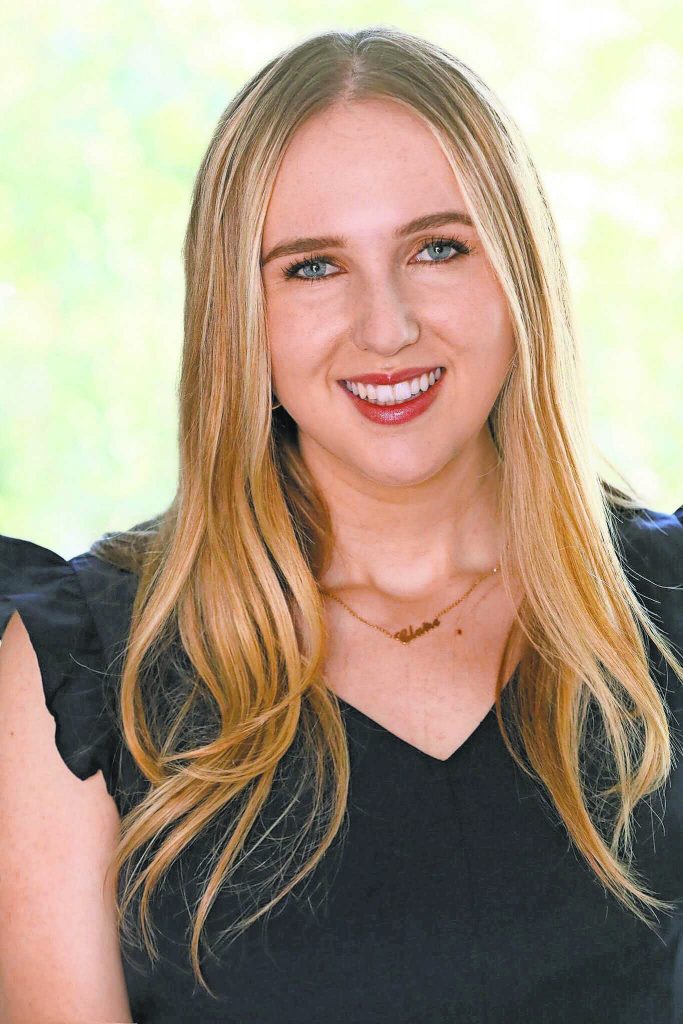

As a high school student, Claire Sliney and her peers set up the nonprofit “The Pad Project.” The initiative finances the purchase of sanitary pad machines to help provide access to menstruation products in areas of the world where women have limited or no access to feminine hygiene products. The Pad Project would go on to become the basis of the Oscar-winning documentary “Period. End of Sentence.”
Each year, the Judith Glick Buckman Fund for the Future recognizes a woman who is using her voice to take steps that will directly and concretely improve the lives of women and girls. On Oct. 6 at the Moorestown Community House, Fund for the Future, a nonprofit organization, will recognize Sliney with the 2019 “Celebrating Women’s Voices” award.
“We saw Claire as the epitome of what we’re trying to accomplish for girls and women,” said Board President Judy Buckman.
Sliney is a junior at the University of Pennsylvania studying philosophy, politics and economics, but she hails from Los Angeles. At the age of 14, she joined her school’s Girls Learn International Club, which sent a delegation of students to the United Nations each year. Sliney’s classmates returned from their trip and began informing their fellow club members about what’d they’d learned.
They’d been introduced to the concept of “period poverty,” and how lack of access to menstruation products can be a barrier to education for women in certain parts of the world. The girls had also learned about a pad machine that creates biodegradable pads at a low cost sourced from local materials.
So, the club decided to begin fundraising to purchase one of these pad machines. The members started with bake sales and backyard fundraisers, and by their senior year, they’d created a Kickstarter campaign to raise enough money for the machine as well as to create some sort of educational component they could disseminate as well. It was this educational component that would become “Period. End of Sentence.”
“People don’t realize that there can be inequality when it comes to periods,” Sliney said. “We thought it could encourage people to start conversations and learn about the issue.”
They hit their $50,000 fundraising goal after two consecutive Kickstarter campaigns and partnered with Action India, a local non-governmental organization located outside of Delhi, India. It was through Action India that they developed the relationships with the local women of Hapur you see documented in the film. Sliney said they didn’t want to impose their presence on them, so only a small contingent made their way to Hapur. While Sliney did not go herself, she did serve as an executive producer on the documentary.
The documentary delves into the stigmas and misinformation surrounding menstruation. It follows the women as they learn to operate the pad machine, create low-cost pads, and in turn, the machines allow these women to earn their own wages as they sell their products. In addition to providing menstrual products, the machine also acts as a catalyst for conversations about menstruation.
“There’s such a change – not only that the people working on the machine experience but other community members. Men in the community – how their attitudes changed and the degrees of acceptance increased – it’s unbelievable to see the shift of mentality,” Sliney said.
Sliney said they never expected the documentary to blow up in the way it has. They had intended to use the piece as an educational tool, and when their director suggested submitting it to film festivals, they agreed that could be a good vehicle to spread awareness about The Period Project. Before they knew it, the film had qualified for and won an Oscar for Best Documentary.
While winning awards has certainly been icing on the cake, more importantly, it’s served as a larger platform for them to get the word out about their efforts. Sliney said they’re working to expand their infrastructure and hope to expand into other communities in the near future. Since the Oscars, they’ve raised money for two more pad machines and messages keep rolling in with suggestions for communities that could be served by a machine.
“People are really catching on to our work and wanting to help us expand, so that’s especially exciting,” Sliney said.
Their documentary’s tagline: “A period should end a sentence, not a girl’s education” especially resonated with members of Fund for the Future. The nonprofit raises money to fund programs that benefit women throughout South Jersey contributing to organizations such as the Alice Paul Institute and the Burlington County League of Women Voters. After reading about Sliney in a few local publications, they reached out to say they were interested in recognizing her with their 2019 award.
“It’s very gratifying, and they have just been so sweet,” Sliney said of the recognition. “I’m really looking forward to the event and continuing to partner with them in any way I can.”
“Period. End of Sentence” is currently streaming on Netflix. Buckman said the 26-minute film will not be shown at the event, and so, they encourage attendees to see it prior to attending. The Oct. 6 event will take place from 3 to 6 p.m. at the Moorestown Community House. The festivities will include Sliney’s remarks, live music, dinner and wine. Tickets are $50 per person.
For information or to purchase tickets, email [email protected], or mail a check with your name, phone, email, and number of guests to: JGB Fund for the Future, P.O. Box 4725, Cherry Hill, NJ 08034. For more information, visit www.jgbfundforthefuture.org.









